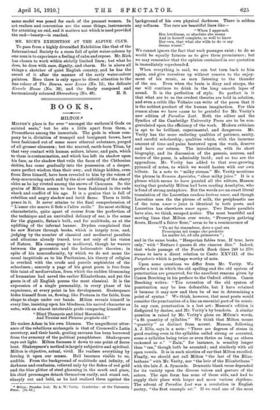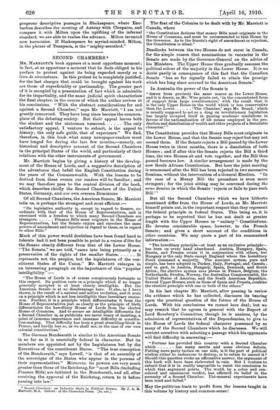BOOKS.
MILTON.* MILTON'S place is for ever " amongst the enthron'd Gods on sainted seats," but he sits a little apart from them, a Prometheus among the immortals. The gods in whose com- pany he is, divinities of tranquil and benignant brows, have been fashioned out of some more ethereal substance, purged of all grosser elements ; but the scarred, earth-born Titan, by that very contact with human soilure, labour, and pain, which to them is contamination, and which has left its shadow upon his face, as the shadow that veils the faces of the Chtbonian deities, has come gradually into the possession of a deeper, more perfect wisdom than their own ; and things hidden, even from Zeus himself, have been revealed to him by the voices of deep-murmuring earth and by the slow unfolding of the starry skies as he lay riveted among the snows of Caucasus. So the genius of Milton seems to have been fashioned in the rude shock and conflict of his age. It is a genius that is full of rebellion and angry shadow and lurid flame. There is little peace in it. It never attains to the final comprehension of L'amor che muove it Sole e l'altre stelle." Its most striking
characteristic, quite apart of course from the perfection of the technique and an unrivalled delicacy of ear, is the sense for the gigantic, Satan's bulk, and for multitude, as at the uplifting of the infernal banner. Dryden complained that he saw Nature through books, which is largely true, and, judging by the number of classical and mediaeval parallels and allusions already traced, true not only of his vision of Nature. His cosmogony is mediaeval, though he wavers between the geocentric and the heliocentric theories ; in spite of his nonconformity, by which we do not mean the usual ineptitude as to his Puritanism, his theory of religion is overlaid with the crude and puerile sophistries of the schoolmen ; scarcely a page of his great poem is free from this taint of mediaevalism, from which the sudden blossoming of humanism had saved the earlier Elizabethans, and yet the poem is of all English poems the most classical. It is the expression of a single personality, in every phase of his experience, at every point in his development. Shakespeare hides himself from us, flowing, like Protens in the fable, from shape to shape under our hands. Milton reveals himself in every line, insisting upon his blindness, his sacred character as vates, with an almost intolerable pride comparing himself to
" Blind Thamyris and blind Maeonides, And Tiresias and Phineus prophets old."
He makes Adam in his own likeness. The magnificent utter- ance of the rebellions archangels is that of Cromwell's Latin secretary, and their harsh, grating sarcasm has been borrowed from the armoury of the political pamphleteer. Shakespeare rays out light. Milton focusses it down to one point of fierce heat. Shakespeare's method is largely subjective and spiritual. Milton is objective, actual, vivid. He realises everything by forcing it upon our senses. Hell becomes visible to us, audible. From the background of multitude and infinity, of darkness and confusion, relieved only by the flakes of red gold and the blue glitter of steel gleaming in the murk and glare, his chief personages detach themselves easily, and stand out, sharply cut and bold, as he had realised them against the
• Milton : Paradise Lost. By A. W. Verity. Ca.mbridge at the University Press. [7s. 6d.]
kackground of his own physical darkness. There is seldom any softness. Too rare are beautiful lines like-
" When I approach Her loveliness, so absolute she seems And in•herself complete, so well to know Her own, that what she wills to do or say Seems wisest."
We cannot ignore the fact that such passages exist ; to do so would be equally fatuous as to give them prominence ; but we may remember that the opinion contained in our quotation is immediately reprehended.
When everything is said, we can but turn back to him again, and give ourselves up without reserve to the enjoy- ment of his music, as men listening to the thunder of the sea. Even when the brain is dizzy and stoops, the
ear will continue to drink in the long smooth lapse of sound. It is the perfection of style. So perfect is it that what are to us the crudest theories are held in solution, and even a critic like Voltaire can write of the poem that it is the noblest product of the human imagination. For this reason alone we have cause to be grateful for Mr. Verity's new edition of Paradise Lost. Both the editor and the
Syndics of the Cambridge University Press are to be con- gratulated upon the efficiency of the work. Modern criticism is apt to be brilliant, experimental, and dangerous. Mr. Verity has the more enduring qualities of patience, sanity, and careful scholarship ; qualities which, with the immense amount of time and pains bestowed upon the work, deserve and have our esteem. The introduction, with its short biography, and its discussion of the genesis, sources, and metre of the poem, is admirably lucid ; and so too are the appendices. Mr. Verity has added to that ever-growing
pyramid of notes, to which we would hasten with our own tribute. In a note to " milky stream" Mr. Verity mentions the phrase in Samson Agonistes, " clear milky juice." It is a phrase which seems to have puzzled all the editors, Masson saying that probably Milton had been reading Aeschylus, who is fond of strong metaphors. But the words are an exact literal translation of the Lucretian cantle= lacteus umor, and though Lucretius uses the the phrase of milk, the periphrastic use of the term umor = juice is identical in both poets, and Lucretius has elsewhere umor aquae. Two Dante parallels
have also, we think, escaped notice. The most beautiful and moving lines that Milton ever wrote, " Proserpin gathring flours, Herself a fairer flour," seem to be a reminiscence of
" Tu mi fai rimembrar, dove e qual era Proserpina nel tempo che perdette La madre lei, ed ells primavera " ;
and in the same books, " Hesperian fables true, If true, here only," with " Nettare e quests di che ciascun dice." Indeed, that whole passage of the Fourth Book (lines 248 to 270)
seems to have a direct relation to Canto XXVIII. of the Purgatorio which is perhaps worthy of note.
Upon some questions we differ from Mr. Verity. We prefer a text in which the old spelling and the old system of punctuation are preserved, for the excellent reasons given by Canon Beeching in his preface to the Oxford edition. Canon Beeching writes : " The retention of the old system of punctuation may be less defensible, but I have retained it because it may now and then be of use in determining a point of syntax." We think, however, that most poets would consider the punctuation of a line an essential part of its music.
In any case, punctuation is a lost art : Masson's edition is disfigured by dashes, and Mr. Verity's by brackets. A similar question is raised by Mr. Verity's gloss on Milton's words,
"a fit quantity of syllables." We think that Milton meant " quantity " as distinct from accent. Masson, following A. J. Ellis, says in a note : "There are degrees of stress in good reading even in the syllables called strong or accented, some a syllables being twice or even thrice as long as others reckoned as a." " Rain," for instance, is sensibly longer than "ran," though both be accented ; and similarly with all open vowels. It is in such niceties of ear that Milton excelled. Finally, we should not call Milton " the last of the Eliza-
bethans" with Mr. Verity, nor "the heir of the Elizabethans" with the late J. A. Symonds. Dramatic blank verse depended for its variety upon the diverse voices and gesture of the actors. The epic form has none of, these aids, and had to supply their place with larger and more various rhythms.
The advent of Paradise Lost was a revolution in English poetry, "the first example set," If we read one of the most
gorgeous descriptive passages in Shakespeare, where Eno- barbus describes the meeting of Antony with Cleopatra, and compare it with Milton upon the uplifting of the infernal standard, we are able to realise the advance. Milton invented new harmonies. If Shakespeare be myriad-minded, Milton, in the phrase of Tennyson, is the "mighty-mouthed."















































 Previous page
Previous page